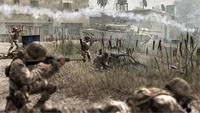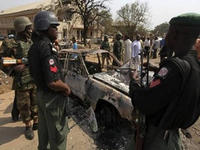-
Administration's Syria plan: limited operation with “downstream” effect
Three leading administration officials yesterday presented, in general detail, the plan of attack on Syria. The plan emphasizes the destruction of delivery vehicles – missiles, rockets, planes and their airfields, and artillery pieces – used in the delivery of chemical weapons. The three officials – Kerry, Hagel, and Dempsey — agreed that such an attack, even if its purpose would be to degrade the regime’s ability to deliver chemical weapons, would have “downstream” effect: these delivery vehicles also deliver conventional munitions, so their destruction would more generally degrade the regime’s ability to fight, thus making the battlefield between the regime and the rebels more level. The Senate Foreign Relations Committee is today drafting a new resolution which would permit up to ninety days of military action against the Syrian government and bar the deployment of U.S. combat troops in Syria but permit the deployment of a small rescue mission in the event of an emergency. The White House also would be required within thirty days of enactment of the resolution to send lawmakers a plan for a diplomatic solution to end the violence in Syria.
-
-
Fusion centers collect information on non-threatening groups

Since the 9/11 attacks, federal and state surveillance of nonviolent student groups, protest movements, and mosques has increased along with the growth of fusion centers. Fusion centers serve as the focal points for the receipt, analysis, gathering, and sharing of threat-related information. According to DHS, there are fifty-three primary fusion centers and twenty-five recognized fusion centers across the United States.
-
-
Police’s facial recognition program becomes a political issue in Ohio
Attorney General Mike DeWine of Ohio confirmed last week that local and state law enforcement have used facial recognition software since June of this year to match images of potential suspects and victims to pictures on the state’s drivers’ licenses and mug shots. The Democratic challenger for the Attorney General post faulted DeWine’s office for launching the program on 6 June without any public notice.
-
-
Security vs. privacy
Those who ask you to choose security or privacy and those who vote on security or privacy are making false choices. That’s like asking air or water? You need both to live. Maslow placed safety (of which security is a subset) as second only to food, water, sex, and sleep. As humans we crave safety. As individuals and societies, before we answer the question “security or privacy,” we first have to ask “security from whom or what?” and “privacy from whom and for whom?”
-
-
White House seeks broad Syria mandate
President Barack Obama and top administration officials described the proposed military strike against Syria as limited in scope, intended to send a signal to Syria that the use of chemical weapons will not be tolerated rather than change the balance of forces in the Syrian civil war. The language of the proposed authorization of force, however, for which the White House is seeking congressional support, appears to be asking for a much broader authority.
-
-
U.S. “black budget” reveals unwieldy bureaucracy, misplaced priorities: expert
Classified budget figures and successes and failures by American intelligence agencies, exposed for the first time this week by the Washington Post, show a massive bureaucracy with misplaced priorities, according to a cybersecurity and privacy expert. “The major failure identified in all of the post-9/11 assessments was a ‘failure to connect the dots,’” the expert said. “Nevertheless, the vast majority of the black budget is being spent on data acquisition — collecting more dots — rather than analysis.”
-
-
Lawmakers mull oversight of U.S. cyberattack capabilities and operations
There has not yet been a public discussion of U.S. offensive cyberattack capabilities — and of actual U.S. cyberattacks — and the subject had been classified until a few years ago. Even after the subject came more into the open, only the fact that the United States had the capability to initiate offensive cyberattacks was acknowledged. With the growing attention to cyber operations – both defensive and offensive — the question of oversight is set to follow.
-
-
Privacy board wants Feds to update security agencies’ operating rules
The independent Privacy and Civil Liberties Board says U.S. national security agencies are operating under outdated rules which should be revised to reflect advances in technology.The oversight board says that rules governing collection and retention of data about Americans need be revised to “appropriately capture both the evolution of technology and the roles and capabilities of the intelligence community since 9/11.”
-
-
Kerry leaves no doubt: U.S. will attack Syria within days, no UN approval sought
In a speech today, Secretary of State John Kerry left no doubt that the Obama administration, within days at most, will launch a series of attacks against the Assad regime for attacking Syrian Sunni civilians with chemical weapons. The chemical attack – not the first one by the regime this year — killed 1,429 people, including 426 children. Kerry said punishing the offending regime was not only the right thing to do morally, but it is essential to protect U.S. national interest and the interests of U.S. allies. The administration has circulated a report, prepared by the U.S. and U.K. intelligence communities, detailing the evidence pointing to the Assad regime’ responsibility for the chemical attack. Kerry: we “make our own decisions on our own timelines, based on our own values and interests”
-
-
British Parliament vote complicates U.S. Syria plans (updated)
In a heavy defeat to Prime Minister David Cameron, the British Parliament voted against British military contribution to or involvement in an attack on Syria in response to the Assad regime’s use of chemical weapons last week. The vote is an embarrassing defeat for Cameron, and a major set-back for President Obama’s plan to put together a coalition of the willing to strike military targets in Syria. The parliamentary vote has no military significance, as the British contribution to the actual military operations would have been minimal at best. The U.K. vote, rather, is a political blow to the United States as it highlights on-going skepticism among Western publics – including U.S. public opinion — about yet another Western military involvement in the Middle East. The British vote is a blow to the United States more generally, as Britain has been the U.S. most loyal ally, and has taken part in every major U.S. military offensive in recent years.
-
-
U.S. military doubts purpose, efficacy of U.S. strike on Syria
The Obama administration’s plan to attack military targets in Syria is not greeted with enthusiasm by a U.S. military still carrying the scars of military involvement in Iraq and Afghanistan and facing deep budget cuts.Many in the military have reservations about a military action in Syria, with the main reservations concerning the potential unintended consequences of launching cruise missiles against Syria. Both supporters and opponents of a strike on Syria, though, agree on one thing: “Remember, with respect to policy choices concerning Syria, we are discussing degrees of bad and worse,” one officer said.
-
-
New analysis suggests war has not disappearing

While some researchers have claimed that war between nations is in decline – see, for example, Steven Pinker’s 2011 book The Better Angels of Our Nature: Why Violence Has Declined — a new analysis suggests we should not be too quick to celebrate a more peaceful world. New study finds that there is no clear trend indicating that nations are less eager to wage war. Conflict does appear to be less common than it had been in the past, but this is due more to an inability to fight than to an unwillingness to do so.
-
-
Divisions in U.K. over Syria action
A U.S.-led attack on Syrian targets in response to the Syrian military’s use of chemical weapons in an attack on Sunni civilians last Wednesday may be delayed until next week in the face of strong opposition in the U.K. parliament to British involvement. Prime Minister David Cameron said MPs would be given a second vote to approve military action ahead of a Commons debate today (Thursday) on Syria, in order to defuse a parliamentary revolt. About seventy Tory MPs said they would join the Labor opposition in voting against the U.K. participating in the attack on Syria. Some of the opponents of U.K. participation say a UN approval of such an attack would be needed, while others say they want to see clear-cut proof of the Assad regime’s culpability.
-
-
Jersey shore towns build protection against future storms

Mantoloking and Brick townships in New Jersey were among the hardest hit by Superstorm Sandy. The storm also destroyed the natural dune barriers which offered a measure of protection. The two cities have decided to take action to minimize the damage of inflicted by a future storm: a $40 million project will see a steel wall —extending sixteen feet above the beach with a depth of thirty-two feet below the ground, and covered in sand to form an artificial dune — will run along the length of the two towns.
-
-
U.S. says Nigeria should do more to combat Islamist Boko Haram

The united States, in talks with Nigeria, says that Nigeria cannot fully achieve its potential as a stable regional leader until the country successfully overcome the challenge of the Islamic insurgency of Boko Haram and secure peace and protection for all its citizens in all regions. In 2012, the United States provided $647 million in bilateral foreign assistance to Nigeria.
-
More headlines
The long view
Factories First: Winning the Drone War Before It Starts
Wars are won by factories before they are won on the battlefield,Martin C. Feldmann writes, noting that the United States lacks the manufacturing depth for the coming drone age. Rectifying this situation “will take far more than procurement tweaks,” Feldmann writes. “It demands a national-level, wartime-scale industrial mobilization.”
No Nation Is an Island: The Dangers of Modern U.S. Isolationism
The resurgence of isolationist sentiment in American politics is understandable but misguided. While the desire to refocus on domestic renewal is justified, retreating from the world will not bring the security, prosperity, or sovereignty that its proponents promise. On the contrary, it invites instability, diminishes U.S. influence, and erodes the democratic order the U.S. helped forge.
Fragmented by Design: USAID’s Dismantling and the Future of American Foreign Aid
The Trump administration launched an aggressive restructuring of U.S. foreign aid, effectively dismantling the United States Agency for International Development (USAID). The humanitarian and geopolitical fallout of the demise of USAID includes shuttered clinics, destroyed food aid, and China’s growing influence in the global south. This new era of American soft power will determine how, and whether, the U.S. continues to lead in global development.
Water Wars: A Historic Agreement Between Mexico and US Is Ramping Up Border Tension
As climate change drives rising temperatures and changes in rainfall, Mexico and the US are in the middle of a conflict over water, putting an additional strain on their relationship. Partly due to constant droughts, Mexico has struggled to maintain its water deliveries for much of the last 25 years, deliveries to which it is obligated by a 1944 water-sharing agreement between the two countries.
How Disastrous Was the Trump-Putin Meeting?
In Alaska, Trump got played by Putin. Therefore, Steven Pifer writes, the European leaders and Zelensky have to “diplomatically offer suggestions to walk Trump back from a position that he does not appear to understand would be bad for Ukraine, bad for Europe, and bad for American interests. And they have to do so without setting off an explosion that could disrupt U.S.-Ukrainian and U.S.-European relations—all to the delight of Putin and the Kremlin.”
How Male Grievance Fuels Radicalization and Extremist Violence
Social extremism is evolving in reach and form. While traditional racial supremacy ideologies remain, contemporary movements are now often fueled by something more personal and emotionally resonant: male grievance.
